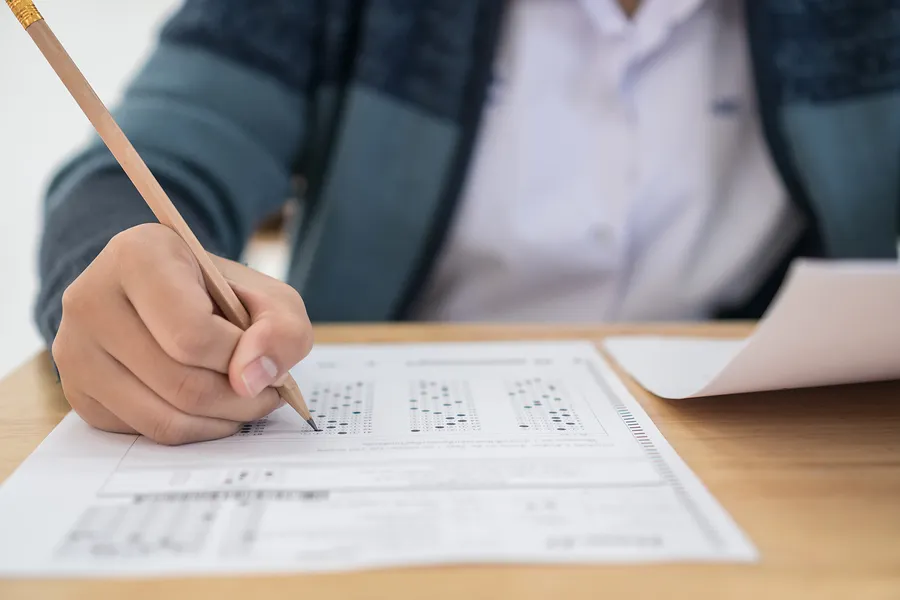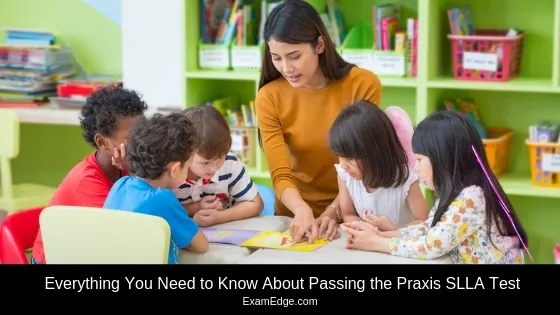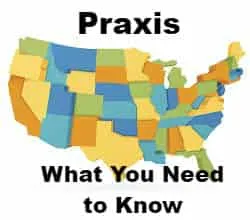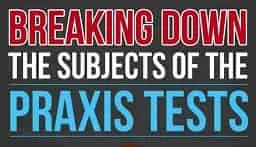
How Long Is the Praxis Math Test? Your 2024 Guide
The journey one undertakes to become a medical professional is more than rewarding. Still, it undoubtedly requires countless years of hard work, accom...
ContinueBefore you can start a fulfilling career in teaching, chances are high that you will need to earn a passing score on one or more Praxis exams. Read on to learn more about the purpose, content, and challenges of the assessment, and how our Praxis exam practice tests can set you up for success.
The Praxis is a series of teacher certification exams created by the Educational Testing Service (ETS). These exams are used by many states and licensing agencies in the United States to certify candidates for teacher licensure. The Praxis exams measure the knowledge and skills of aspiring teachers in specific content areas, as well as their general teaching potential.
The Praxis tests are a series of exams that are usually required for licensure before you can begin your teaching career. The exams evaluate your ability to lead a classroom in your subject area and consist of three exams: the Praxis Core Academic Skills for Educators test, Praxis Subject Tests, and Praxis Content Knowledge for Teaching (CKT) Assessment.
Praxis exams are created and administered by ETS, and range in topics from elementary education to high school chemistry and beyond. No matter the subject however, you can confidently prepare yourself with Exam Edge's Praxis exam prep.
Additionally, depending on your state and the subject matter you wish to teach, more tests may be required. But do not worry! We have you covered with region and content-specific practice exams.
Praxis exams can be challenging. Without adequate study, you could be left with a failing score and a potential retake hanging over your head. Fortunately, we can help you prepare. Start by getting familiar with the exams by taking a practice Praxis test from Exam Edge and checking out our informative blog posts.
Regardless of which teaching exams you need to pass, Exam Edge has the Praxis practice test to help you achieve the highest grade possible. Find the Praxis test prep you need today and get ready for your future.
Anyone who seeks to become a teacher and requires certification before starting their career should take the Praxis Core. In many states, a teacher candidate must earn a passing score on the Praxis Core exam in order to apply for their teacher’s license or certification.
The Praxis II Subject Assessment exams are subject or grade-specific, which helps ensure the prospective teacher has the depth of knowledge required to shape the minds of others. For instance, aspiring middle school science teachers are often required to take the Praxis Middle School Science (5440) exam before they can take a classroom teaching position. Whether you hope to specialize in library media or lead deaf students through their curriculum, there is a Praxis test available to qualify you for the job.
The Praxis CKT Assessment exams are less commonly required than the Praxis Core and Praxis II Subject Assessments, and test elementary teachers on their classroom technique. No matter which version you take, however, Exam Edge's Praxis practice exams can help give you the confidence you need to pass with flying colors.
In many cases, educators will need to take more than one Praxis test. It can be dizzying trying to undergo Praxis prep for multiple standardized tests. Fortunately, we offer several practice tests that help you to hone your test-taking skills for the specific content of the Praxis Core, Praxis II, or Praxis CKT Assessment exams. Just as you would encourage students to adequately prepare for a big exam, it is important to study for each of the three Praxis tests independent of one another. Praxis test prep can help ensure you are ready for whichever exam you might need to take.
Keep in mind that each licensing organization and state has their own method of certifying teachers. While Praxis is among the most common teacher certification assessments, others may be required in your state. You can check with the U.S Department of Education to learn more about specific certification requirements for your state. You can also look into organizations like The American Board of Certification for Teacher Excellence, for example, which has a Professional Teaching Knowledge exam that is required for some positions.
There are well over 100 kinds of Praxis tests. Read on for an overview of some of the most common ones.
The Praxis Core Academic Skills for Educators, commonly referred to as the Praxis Core, is made up of three exams that test prospective teachers on their general knowledge of reading, writing, and mathematics fundamentals. This is perhaps the most popular version of the Praxis and is one most educators will be required to take before they begin working with students. While it may seem like a straightforward, generalist exam, the Praxis Core Academic Skills for Educators demands preparation.
The Parapro Assessment is targeted toward aspiring paraprofessionals and those already working in the field. It tests your skills in reading, writing, and math, and your abilities to apply those skills in the classroom.
The Praxis Reading for Virginia Educators (RVE) exam series is a required part of certification for Virginia teachers. It includes the Elementary & Special Education Exam (Praxis 5306) and the Reading Specialist exam (Praxis 5304).
The Praxis School Leadership Series (SLS) tests are specifically geared toward principals, superintendents, and other school administrators. These tests will evaluate your professional abilities relevant to those roles. Three tests make up the SLS:
There are Praxis tests available for more than 90 subject specializations, from algebra and art to world languages and history. Teacher candidates take these tests as part of their credentialing process for their state or for their professional organization. Exam Edge offers practice tests for dozens of Praxis subject tests, and you can find them all on this page.
The exact scoring breakdown is specific to the test you take, but there are some blanket rules for how Praxis exams are scored:
There is no universal passing score across states and test types. Instead, state agencies set their own benchmarks for what constitutes a passing score. To find out what score you need to get to pass the Praxis exam you plan to take, check with the Department of Education or other teacher licensing agency in your state.
Learn more about the ins and outs of scoring with our guide to understanding your Praxis exam scores.
Not sure how to prepare for the Praxis exams? No matter which test you are preparing for, you will need to take the following steps to apply, register, and take the exam.
Step 1: Check Eligibility and Apply
Before registering for a Praxis exam, you should first check the requirements for teacher certification in the state where you plan to teach. Each state has different requirements for which Praxis exams you need to take and what scores you need to achieve. Once you have determined which exams you need to take, you can register for the Praxis exams online through the ETS.
Step 2: Schedule the Exam
After registering, you can schedule your exam. The Praxis exams are offered at various times throughout the year and at various locations across the United States. You can find a test center near you and choose a date and time that works best for you through the ETS website. Be sure to schedule your exam well in advance to secure your preferred date and time.
Step 3: Practice, Practice, Practice!
Once you are signed up for the exam, the most important part of test prep begins! Create a study plan that includes frequent practice tests. Not only will Praxis sample questions help you get comfortable with the format and style of the official exam, but they will also help you evaluate your strong and weak areas so you can better focus your studying efforts.
Step 4: Take the Exam
On the day of the exam, you should arrive at the test center early so you have enough time to check in. You will need to bring a valid, government-issued ID with you. The Praxis exams are computer-based, and you will be provided with all necessary materials at the test center. After the exam, your scores will be available to view and send to the state licensing agency or other recipient of your choice through your online ETS account.
For more information about the Praxis exams, including registration, scheduling, test preparation materials, and score reporting, visit the ETS.
Test length varies across the different Praxis tests. A single series test, like the Praxis Core, takes about 5 hours to complete, while Praxis subject tests can range from 1 to 4 hours in duration.
Each type of test has a unique number of questions. For a specific breakdown of questions for the test you plan to take, find your test through the ETS and download the Study Companion.
There are plenty of resources online to help you through the Praxis exams. In fact, Exam Edge has numerous free resources dedicated to achieving the high Praxis score you need to ensure a bright future. We are your go-to source for Praxis test prep tools. We recommend mastering at least five key concepts to pass the Praxis exam, including the context of your particular test and where your blind spots lie.
With our practice tests, you can craft a Praxis study guide tailored specifically to the areas where you struggle, get real-time feedback and explanations on any incorrect answers, and familiarize yourself with the pacing of the actual test.
The best way to understand the test inside and out is simply to take the exam — but the price of multiple tests can add up, and you do not want multiple failures on your record. Instead, we provide Praxis practice tests that mimic the real deal.
To take Praxis practice tests, simply search our site for your intended test. Buy one or save big by purchasing a bundle. Then, dive in and see how a practice Praxis test from Exam Edge can maximize your efforts!
The Praxis is a series of teacher certification exams created by the Educational Testing Service (ETS). These exams are used by many states and licensing agencies in the United States to certify candidates for teacher licensure. The Praxis exams measure the knowledge and skills of aspiring teachers in specific content areas, as well as their general teaching potential.
Before registering for a Praxis exam, you should first check the requirements for teacher certification in the state where you plan to teach. Each state has different requirements for which Praxis exams you need to take and what scores you need to achieve. Once you have determined which exams you need to take, you can register for the Praxis exams online through the ETS website.
After registering, you can schedule your exam. The Praxis exams are offered at various times throughout the year and at various locations across the United States. You can find a test center near you and choose a date and time that works best for you through the ETS website. Be sure to schedule your exam well in advance to secure your preferred date and time.
On the day of the exam, you should arrive at the test center early to allow time for check-in procedures. You will need to bring a valid, government-issued ID with you. The Praxis exams are computer-based, and you will be provided with all necessary materials at the test center. After the exam, your scores will be available for viewing and sending to the state licensing agency or other recipient of your choice through your online ETS account.
For more information about the Praxis exams, including registration, scheduling, test preparation materials, and score reporting, visit the ETS website at www.ets.org/praxis.
The Praxis Core series exams such as the Praxis Core Mathematics (5733) exam, Praxis Core Reading (5713) exam, Praxis Core Writing (5723) exam, and Praxis Core Combined (5752) exam was developed to challenge educators on their knowledge of core academic skills. Specifically, these tests help determine whether aspiring teachers have a working knowledge of math, reading, and writing – the foundational skills necessary to teach just about any course. No matter what grade level or subject area you hope to teach, the Praxis Core can help verify that you have the abilities and skills to do so. A Praxis Core practice test can help those registered for such exams prepare in advance.
The Praxis Core exams consist of three main subsets: reading, writing and mathematics. No matter your professional goals, you’ll likely need to earn a passing score on each subset of questions in order to earn your teaching license. Take a Praxis II practice test to see how you’d fare if the exam were today – the results can guide your test prep and study sessions moving forward.
Passing the Praxis is crucial for those hoping to begin their teaching careers. It’s no wonder so many people are eager to learn how to prepare for the Praxis. While there are several different strategies worth employing, none are better than practice testing. A Praxis practice test mimics the testing experience, giving examinees the chance to preview the kinds of questions they’ll face on the real test. Detailed explanations of each answer help Praxis registrants understand which content areas merit further study and which they’ve mastered completely. A Praxis Core practice test can give you the confidence you need to walk into the testing center with your head held high.
Registration for the Praxis Core tests can be done throughout the year. Registration fees for the combined test total $150†, whereas registration for individual subtests is $90† each. There are three ways in which an individual can register.
For online registration, simply navigate to the official Praxis website and create an account. Once you’ve done so, you’ll be able to view upcoming testing opportunities and sign up for the test you need.
† Note: The above information is provided for your convenience. Exam Edge does not guarantee nor provide warranty to the accuracy or completeness of this information. Please visit the official Praxis website at ETS Praxis Home to confirm fees, registration, and testing requirements before registering.
Test-takers must answer 56 questions in 85 minutes when taking this Praxis Communication and Literacy Reading exam. Content covered by the test includes comprehension of key ideas and details of passages. Craft, structure, and language skills are also measured. A person’s ability to integrate knowledge and ideas into their Communication and Literacy Reading is tested, too. To be successful, you’ll need to practice close Communication and Literacy Reading and applying what you’ve read in a critical way. No matter how confident you are in Communication and Literacy Reading, you’ll want to polish up on core areas with practice tests from Exam Edge.
The Praxis Communication and Literacy Writing certification test is a standardized exam designed to evaluate the writing skills and knowledge of aspiring teachers. It measures candidates' ability to effectively communicate in written English, which includes understanding grammar, language structure, and writing conventions. The exam consists of multiple-choice questions and essay writing, testing both argumentative and informative/explanatory writing skills. Passing this Praxis test is often a requirement for teacher licensure in many US states. It ensures future educators have the necessary written communication skills to succeed in a classroom setting.
Launch your teaching career with the Praxis Core Academic Skills for Educators: Combined test. Designed to measure your knowledge of math, reading, and writing, the exam is often mandatory for new teachers seeking certification. With more than 40 questions on each portion of this exam, the combined Praxis makes it easy to prove you know your stuff. Of course, the test is also designed to measure how well you perform under pressure. Study smarter, not harder, with our library of practice tests. Not only will our tools help familiarize you with the format of the Praxis, but they’ll help you identify gaps in your knowledge, giving you plenty of time to brush up before the real thing.
Math reasoning skills are put to the test with this Praxis exam. 56 multiple-choice questions are to be answered in a matter of just 90 minutes. Roughly 30 percent of the questions cover number and quantity concepts. Another 30 percent is dedicated to algebra and functions. 20 percent cover geometry questions and the final 20 percent include questions on statistics and probability. No matter your math background, a passing score on this test is possible with enough practice. Review the fundamentals with practice tests from Exam Edge.
Test-takers must answer 56 questions in 85 minutes when taking this Praxis reading exam. Content covered by the test includes comprehension of key ideas and details of passages. Craft, structure, and language skills are also measured. A person’s ability to integrate knowledge and ideas into their reading is tested, too. To be successful, you’ll need to practice close reading and applying what you’ve read in a critical way. No matter how confident you are in reading, you’ll want to polish up on core areas with practice tests from Exam Edge.
With questions gauging your grammar, sentence structure, word choice and mastery of the English language, the Praxis demands excellence of the future teachers of America. You’ll have just 100 minutes to 40 multiple-choice questions and two essay questions. Before you sit for the exam, be sure you’re clear on verb tenses, pronoun cases, idioms and how to avoid double-negatives. Not sure how your writing skills will measure up? A practice test can give you the insight you need when preparing for the Praxis writing test. They’ll also help you familiarize yourself with the format of the exam before taking the real thing!
Classroom instruction, reading, writing, and mathematics skills are all put to the test with the Praxis Parapro Assessment. Designed to measure a person’s knowledge of basic education fundamentals, this test is typically required of teaching assistants who work in the classroom. This certification exam doesn’t just test how well you know your stuff. It also measures your ability to think quickly under pressure. You’ll have 2.5 hours to answer 90 questions on reading, writing and mathematics on this computer-based exam. Get the practice you need before taking the real test with Exam Edge.
The Praxis Reading for Virginia Educators: Elementary and Special Education Teachers (5306) exam was intended for entry-level special education and elementary school teachers. Registration is possible only once candidates have completed training in programs for either of these specialty areas. Designed to determine the abilities, knowledge and skills of new educators in Virginia, the test covers content necessary for the teaching of reading. To prepare, take time to review the principles of oral and written communication.
The Praxis Reading for Virginia Educators: Reading Specialist (5304) test was intended for entry-level reading specialists hoping to work in the public schools of Virginia. Registration for this exam is only possible once the candidate has completed the necessary training programs. Created to measure the knowledge, skills, and abilities of new reading specialists, the exam covers a wide range of content necessary for the role. Preparation should include practice testing and a review of oral communication and writing skills.
This exam measures a person’s readiness to lead a K-12 school as a principal, assistant principal, dean or other administrator. The hands-on experience you have gained through the years can help inform your performance on the Praxis, but success on the test depends greatly on the amount of studying you do. The first section of the exam consists of 120 questions to be answered in 165 minutes. For the second section, you’ll face four written response-style questions to be answered in 75 minutes. With a few practice exams, you’ll have a better idea of what to expect from this challenging test.
More than 120 questions on leadership skills, organizational development, and curriculum design await those registered for this exam. The three-hour test is designed to gauge your knowledge, experience, and ability to perform when the pressure is on. While your long career in education can help inform much of your performance on the Praxis, it’s important to dedicate plenty of time for test prep, too. Our library of practice tests is the perfect resource for busy professionals who are eager to study as efficiently as possible.
Teachers entering the classroom with specific subject areas in mind may be required to take Praxis Subject Assessments. These exams were developed to measure the content knowledge of new educators, especially as it pertains to specific subject areas like algebra, literature, or physical education, for example. While Praxis Core assessments gauge an educator’s knowledge of foundational math, writing, and reading skills, the Praxis Subject Assessments are more focused on subject area content knowledge. Regardless of which exam you plan to take, a Praxis Subject Assessment practice test can help you prepare.
A Praxis practice test is the ideal way to prepare for your Subject Assessment Tests. This convenient study tool gives you a preview of how you might perform on the exam if it were happening today. You can leverage your results to identify gaps in your knowledge, allowing you to refocus your study efforts and use your study time efficiently.
Registration for some Praxis Subject Assessment tests can be done throughout the year, while other tests are only available during specific window periods. Registration fees for Praxis Subject Assessment tests can vary and range between $50† and $199†. As with the Praxis core exams, there are three ways in which an individual can register for the Praxis Subject Assessment tests.
For online registration, simply navigate to the official Praxis website and create an account. Once you’ve done so, you’ll be able to view upcoming testing opportunities and sign up for the test you need.
† Note: The above information is provided for your convenience. Exam Edge does not guarantee nor provide warranty to the accuracy or completeness of this information. Please visit the official Praxis website at https://www.ets.org/praxis to confirm fees, registration, and testing requirements before registering.
Your knowledge of the principles of algebra, functions and statistics are all examined on the Praxis Algebra I test. Created to gauge a person’s mastery of algebraic fundamentals, this exam is required of mathematics teachers hoping to work in middle and high schools. Your ability to think under pressure is measured alongside your math skills, with 60 questions to answer in 150 minutes. Familiarize yourself with the format of the test with Exam Edge before you take the real thing!
Art making, art history, and art analysis are all fair game for questions on the Praxis Art: Content and Analysis exam. Be ready to face 88 questions in 120 minutes on the day of the test. While you might feel confident in your knowledge of the material, it’s smart to invest some time familiarizing yourself with the format and timing of the test. Give Exam Edge’s practice tests a try before the day of the real test – you’ll feel more prepared for whatever question comes your way!
Aspiring art teachers should sign up for this challenging exam, but not before spending plenty of time taking practice tests. You’ll want to brush up on your knowledge of art making, media and processes, and the historical and theoretical foundations of art before sitting for the actual test. Comprised of 120 questions to be answered in two hours, the exam is designed to gauge your mastery of the fundamentals of art theory. With Exam Edge’s practice tests, you’ll get the chance to see how you’d perform if the test were tomorrow!
Audiologists working in schools must demonstrate their knowledge and comprehension of key principles before they can earn their professional license. The Praxis Audiology exam was designed to gauge just that. Featuring 120 questions to be answered in two hours, the test includes items on prevention, identification, assessment, intervention and professional issues. Before you sign up for the test, consider taking a few practice tests with Exam Edge. It’ll give you a good idea of how you’d perform on the test if it were happening today!
Audiologists working in schools must demonstrate their knowledge and comprehension of key principles before they can earn their professional license. The Praxis Audiology (5343) exam was designed to gauge just that. Featuring 120 questions to be answered in two hours, the test includes items on prevention, identification, assessment, intervention and professional issues. Before you sign up for the test, consider taking a few practice tests with Exam Edge. It’ll give you a good idea of how you’d perform on the test if it were happening today!
Get ready to tackle 150 multiple-choice questions in 2.5 hours with the Praxis Biology test. Brush up on topics including the history and nature of science, molecular and cellular biology, and genetics and evolution before you sit for this challenging test. Flashcards and study guides can help, but nothing replicates the test environment like Exam Edge. Our practice tests are designed to help you identify gaps in your knowledge and prepare you for the format and timing of the actual Praxis test.
Get ready to tackle 150 multiple-choice questions in 2.5 hours with the Praxis Biology: Content Knowledge test. Brush up on topics including the history and nature of science, molecular and cellular biology, and genetics and evolution before you sit for this challenging test. Flashcards and study guides can help, but nothing replicates the test environment like Exam Edge. Our practice tests are designed to help you identify gaps in your knowledge and prepare you for the format and timing of the actual Praxis test.
Two hours and 120 questions await those hoping to teach the future business leaders of the world. The Praxis Business Education test is designed to gauge a person’s understanding of accounting, finance, law, international business, and career development, among other topics. Prepare for whatever question comes your way with Exam Edge. Our online practice tests can help you identify business education blind spots in your knowledge so that you can perform at your highest level on test day.
Get ready to face 125 questions in 2.5 hours on the Praxis Chemistry test. This exam was created to gauge the readiness of aspiring chemistry teachers. Feeling confident in your ability to pass on your first attempt? Take one of our free sample practice tests to see how you’d fare if the test were happening today! It’s the best way to identify gaps in your knowledge while familiarizing yourself with the format and timing of the exam.
Get ready to face 125 questions in 2.5 hours on the Praxis Chemistry: Content Knowledge test. This exam was created to gauge the readiness of aspiring chemistry teachers. Feeling confident in your ability to pass on your first attempt? Take one of our free sample practice tests to see how you’d fare if the test were happening today! It’s the best way to identify gaps in your knowledge while familiarizing yourself with the format and timing of the exam.
Aspiring social studies, government, and history teachers should take the Praxis Citizenship Education: Content Knowledge test. A passing score on this exam can prove your mastery of fundamental concepts like geography, economics and political science. Made up of 120 multiple-choice questions, this test must be completed in two hours or less. Fail to pass on your first attempt and you’ll be out both time and money. By incorporating practice tests from Exam Edge into your preparation, you can study smarter, not harder.
The Praxis Early Childhood Assessment certification test is a standardized examination designed to assess the readiness of aspiring educators for teaching young children. It covers a broad range of topics including language and literacy, mathematics, social studies, science, health, and the arts. The test's objective is to ensure that educators possess the necessary knowledge and skills to effectively teach and nurture children in their early developmental stages. The certification is often required by states in the U.S for licensing and is recognized as a significant benchmark in the education field.
The Praxis Early Childhood Assessment - Mathematics and Science certification test is a standardized exam designed for aspiring early childhood educators. It evaluates their proficiency in math and science concepts relevant to early childhood education. The assessment covers basic mathematics, physical science, life science, and earth and space science. The test requires knowledge of mathematical operations, scientific inquiry, understanding of fundamental scientific concepts, and ability to implement age-appropriate science and math activities. Passing this certification test demonstrates that a candidate possesses the appropriate knowledge and skills to effectively teach these subjects in an early childhood setting.
The Praxis Early Childhood Assessment - Reading and Language Arts & Social Studies certification test is an examination designed for prospective teachers in the early childhood education field. It evaluates the educator's knowledge and skills in reading, language arts, and social studies instructional practices. The test covers key concepts such as language development, reading comprehension, writing, speaking, and listening skills. It also explores understanding of social studies topics like history, geography, and civics. This comprehensive exam ensures teachers are prepared to provide high quality education in these fundamental areas.
Before new early childhood educators enter the classroom, they must first demonstrate their mastery of the subject areas and skills they’ll teach. The Praxis Early Childhood: Content Knowledge exam gauges the competence level of such professionals. Over the course of two hours, aspiring teachers will face 120 questions on everything from emergent literacy to the processes of scientific inquiry. This challenging test should not be underestimated. Prepare for your Praxis by taking practice exams with Exam Edge.
The Praxis Early Childhood Education test was created to gauge the knowledge and skills of aspiring preschool and elementary school educators. The computer-based exam consists of 120 multiple-choice questions to be answered in a span of two hours. Aligned to the standards set by the National Association for the Education of Young Children, this test includes items on everything from health and physical education to language and literacy. With such a wide range of content areas being addressed, early childhood educators owe it to themselves to take as many practice tests as possible in the lead up to the exam.
Spanning 125 multiple-choice questions over a two-and-a-half hour testing period, the Praxis Earth and Space Sciences: exam demands preparation. Topics including astronomy, tectonics and the Earth’s internal and surface processes are all fair game for this test. Many school districts require a passing score on the exam from those hoping to teach Earth Science or Astronomy, so you’ll want to be sure you’re performing at the highest level possible on the day of the test. Exam Edge’s library of practice tests and resources can help you pass on your very first attempt, saving you valuable time and money.
Spanning 125 multiple-choice questions over a two-and-a-half hour testing period, the Praxis Earth and Space Sciences: Content Knowledge exam demands preparation. Topics including astronomy, tectonics and the Earth’s internal and surface processes are all fair game for this test. Many school districts require a passing score on the exam from those hoping to teach Earth Science or Astronomy, so you’ll want to be sure you’re performing at the highest level possible on the day of the test. Exam Edge’s library of practice tests and resources can help you pass on your very first attempt, saving you valuable time and money.
Macroeconomics, microeconomics and other fundamental economic concepts are the basis of questions on the Praxis Economics exam. Comprised of 110 multiple-choice questions, the test spans two hours. During that time, you’ll face questions on everything from government policy to economic performance and fluctuations. Brush up on your knowledge of economics ahead of your test and you’ll pass with confidence. A practice test can help you identify blind spots in your exam prep and ensure you’re studying as efficiently as possible.
Over the course of two hours, those registered for the Praxis Education of Exceptional Students: Core Content Knowledge will face 120 questions. This computer-based exam covers topics like professional responsibility, the development of learners, as well as instruction and assessment. A passing score is required of special education teachers by many state education licensing boards. Ensure you’re adequately prepared for whatever question might be asked of you with help from Exam Edge.
Designed to gauge the readiness of educators hoping to work with kids aged 0-8 years, the Praxis Education of Young Children exam consists of 120 multiple-choice questions. The test also includes three constructed response items, where aspiring teachers must answer prompts about the fundamentals of childhood education. With an examination window of 150 minutes, this test will challenge your stamina as well as your knowledge. Take plenty of practice tests to ensure a passing score the first time you attempt this challenging exam.
Those registered for the Praxis Educational Leadership: Administration and Supervision exam will have two hours and 45 minutes to answer 120 selected-response questions. Designed to gauge the readiness of entry-level school leaders, this test is aligned with the 2015 Professional Standards for Educational Leaders. Expect questions on strategic and instructional leadership, as well as ethics and organizational development. A practice test is the ideal way to prepare for this challenging exam.
Examinees registered for the Praxis Elementary Education Social Studies (5904) should prepare themselves for 60 multiple choice questions to be answered in 560 minutes or fewer. Designed to determine whether a teaching candidate is ready for the classroom, this subtest is comprised of material covered in most elementary education bachelor’s degree programs. To ensure a passing score on your very first attempt, study up on United States history, anthropology, world geography and economics.
Examinees registered for the Praxis Elementary Education 3 test bundle (5901) should prepare for 3.05 hours of multiple-choice questions on math, science, and social studies. Each subject has its own dedicated subtest for a total of 165 questions. Designed to examine the classroom readiness of entry-level elementary educators, the test mirrors the curriculum outlined in the Common Core Standards. Expect questions on everything from measurement and data interpretation to world history and economics.
The Praxis Elementary Education Assessment certification test is a standardized examination for prospective elementary school teachers. It measures knowledge and skills in five subject areas: Reading and Language Arts, Mathematics, Social Studies, Science, and Art, Music, and Physical Education. The test is designed to reflect the content knowledge an entry-level teacher needs to teach effectively in an elementary school. Passing the Praxis Assessment is often a requirement for teacher licensing or certification in many U.S. states. It is administered by Educational Testing Service, a private non-profit organization.
Before new elementary school teachers can enter the classroom professionally, they must demonstrate their mastery over the content they’ll be instructing. The Praxis Elementary Education Content Knowledge exam (5018) helps measure the readiness of aspiring educators. Comprised of 140 questions, the computer-based test spans 150 minutes. In that time frame, you’ll face questions about the four main elementary school content areas: math, science, reading, and social studies. Aligned with Common Core standards, this challenging exam ensures each teacher is prepared to instruct students with fidelity.
The foundations of learning theory are the basis for the Praxis Elementary Education: Curriculum, Instruction, and Assessment (5017) exam. Brush up on your knowledge of pedagogical processes and principles ahead of this exam, comprised of 120 questions to be answered in 130 minutes. Reading, math, science, social studies, art, music and physical education are all fair game for this test, so it’s important to take a well-rounded approach to preparation. Practice exams are a great way to cover all your bases in the weeks leading up to this test!
Put your knowledge of curriculum planning, instructional design, and student assessment to the test with the Praxis Elementary Education Curriculum, Instruction and Assessment exam (5011). Designed to measure the classroom readiness of elementary school educators, this test is comprised of 110 questions to be answered over the course of two hours. Computer-based and multiple choice, the exam will gauge your understanding of teaching and learning principles as well as your ability to put them into action in the classroom.
Prospective elementary school educators will have two hours and 50 minutes to complete 124 questions on the Praxis Elementary Ed Instructional Practice and Applications test (5019). This exam was designed to measure a candidate’s content knowledge as well as their familiarity with pedagogical processes. Be ready to face both multiple choice and constructed-response questions about reading, math, science, social studies, art, physical education and music. The problem-solving skills of prospective teachers will also be gauged through real-world scenarios and thoughtfully written responses.
Entry-level educators may opt to register for the Praxis Elementary Education Mathematics Subtest (5903) separately or together with the other subtests that comprise this overall exam. Be prepared to answer 50 questions about the principles of mathematics for elementary students, including topics like algebraic formulas, geometry, data interpretation and probability. You’ll have just 65 minutes to prove your mastery of these concepts and other mathematical fundamentals, so it pays to take plenty of practice tests in preparation for the real thing.
Four separately-timed exams comprise the Praxis Elementary Education Multiple Subjects test (5001). With 4.25 hours to complete the four sections, entry-level elementary educators should be ready to face questions on the four main content areas: math, reading, social studies and science. Created to support a generalist elementary teaching license, this challenging computer-based exam includes both multiple-choice and numeric-entry questions. A scientific calculator will be available for use on the math section.
The Praxis Elementary Education Multiple Subjects Mathematics (5003) is a subtest of the larger Praxis Elementary Education Multiple Subjects exam. Many elementary educators opt to take all four subtests in one day, though it is possible to register for the math subtest alone. The subtest will gauge your mastery of elementary principles of mathematics, including geometry, algebra and measurement of data. 40 questions must be answered in a span of 50 minutes.
This subtest of the larger Praxis Elementary Education Multiple Subjects exam challenges entry-level elementary school educators on their knowledge of reading and language arts. The Praxis Elementary Education Multiple Subjects Reading and Language Arts (5002) is made up of 65 multiple-choice questions to be answered in the span of one hour. Expect questions on the foundational skills of reading, along with items on literature, communication skills, grammar and phonological awareness. Register for this subtest along with the science, social studies and mathematics subtests to complete the larger Multiple Subjects Praxis exam.
Examinees of the Praxis Elementary Education Multiple Subjects Science (5005) will face 55 multiple choice questions to be answered over the span of one hour. Created to gauge the classroom readiness of new elementary school educators, the exam features questions on Earth Science, Physical Science and Life Science. An on-screen scientific calculator is provided to support your efforts during the exam, but your broad knowledge of scientific principles and theory will be the focus of this Praxis subtest.
Put your knowledge of geography, world economics and United States history to the test with the Praxis Elementary Education Multiple Subjects Social Studies (5004) exam. Designed to measure each teaching candidate’s classroom readiness, this challenging test is made up of 60 multiple choice questions to be answered in 60 minutes or less. Before you put your knowledge to the test, brush up on key terms, ideas and theories so you pass your Praxis on your very first attempt!
The Praxis Elementary Education Reading and Language Arts & Social Studies certification test is a standardized examination designed for prospective elementary school educators. It assesses their understanding and ability to teach these specific subjects. The test covers topics such as reading comprehension, language arts, world history, geography, government, and economics. The aim is to ensure that teachers have the necessary knowledge and skills to effectively educate young students. This rigorous assessment is a crucial step towards achieving a teaching license in many U.S. states.
The Praxis Elementary Education Science (5905) is comprised of 55 multiple choice questions to be answered in 60 minutes or less. Based on the subject matter typically explored in an elementary education college training program, this test ensures that new teachers are indeed ready for the classroom. To ensure a passing score on your first attempt, brush up on topics including the Earth’s structure, the theory of motion and law, and science as inquiry.
The Praxis Elementary Mathematics and Science certification test is a standardized exam for prospective teachers. It assesses their understanding and ability to instruct elementary-level math and science. The test covers various topics, including numbers and operations, algebra, geometry, data analysis, earth science, life science, and physical science. It is designed to ensure prospective teachers have the knowledge and skills necessary to educate students effectively. The Praxis test is commonly required for licensure or certification in many states in the U.S. and is administered by the Educational Testing Service (ETS).
Entry-level educators may opt to register for the Praxis Elementary Mathematics Applied CKT (7903) exam separately or as part of the larger Elementary Education: Applied Content Knowledge for Teaching exam. However you decide to register, you’ll face 50 questions in a span of 85 minutes on this challenging subtest. Prepare now for selected-response, numeric-entry, and short constructed-response questions on topics including fractions, decimals, measurement, geometry and more. This exam challenges registrants on their knowledge of both pedagogy and the theory behind mathematical principles.
The Praxis Elementary Mathematics CKT (7803) exam centers around the essential content knowledge necessary for teaching math to elementary school students. Made up of 52 questions to be answered in 85 minutes or less, this test measures the specific content knowledge required for teaching mathematical principles. You’ll face multiple choice and numeric-entry questions on everything from representatives and manipulatives to early equations and expressions. Prepare ahead of time to ensure you pass this challenging exam on your very first attempt!
Examinees of the Praxis Elementary Reading and Language Arts CKT (7802) will have 90 minutes to answer 63 questions on the essential content required for teaching language arts and reading to elementary students. Comprised of both multiple choice and numeric-entry questions, this exam challenges educators on their knowledge of foundational literacy skills. It’s not enough to be good at reading and writing – to pass this test, you’ll need to demonstrate your mastery of concepts including phonological awareness, fluency and the conventions of American English.
The Praxis Elementary Science CKT (7804) is identical in content to the Praxis Elementary Science Applied CKT (7904). Both tests give aspiring elementary school science educators an hour to answer 47 multiple choice questions. Designed to examine the skills, understanding, and potential of future science teachers, this Praxis test will cover both subject area content and pedagogical theory. Brush up on your knowledge of the scientific method, the fundamentals of Earth science and the basics of biology before test day and you’re sure to succeed!
Examinees of the Praxis Elementary Social Studies Applied CKT (7905) test will face 55 questions over a span of 50 minutes. Based on social studies subject matter usually explored in collegiate elementary education programs, the exam helps qualify new teachers for certification. To ensure you’re indeed prepared for this challenging test, take time to study American history, economics, geography, and world history. You’ll need both broad historical knowledge and serviceable pedagogical skills in order to pass this Praxis test!
The Praxis Elementary Social Studies CKT (7815) subtest is comprised of 60 questions to be answered in 50 minutes or less. Reflecting the Content Knowledge for Teaching standards CKT subtests consist of multiple-choice questions to gauge your broad understanding of the subject. By answering questions about the content you’ll eventually teach students, you demonstrate your mastery of both pedagogical practice and historical foundations. To ensure a passing score on your first attempt, make time to review the principles of government, geographym American and world history.
Your knowledge of writing, reading, and vocabulary will be put to the test on the Praxis English Language Arts: Content and Analysis (5039) exam. Designed to assess the knowledge and skills of aspiring secondary school English Language Arts teachers, the test is made up of 130 selected-response questions and two constructed-response items. You’ll have just three and a half hours to complete this challenging exam, so be sure to prepare well in advance of your test date. Covering everything from logical fallacies to Metaphysical poetry, this Praxis demands serious studying.
130 selected-response questions await secondary school educators registered for the Praxis English Language Arts: Content Knowledge (5038). The two hour and 30 minute exam was created to measure a candidate’s knowledge and skills before they enter the classroom. Deemed necessary for professional practice, the subjects on this challenging Praxis test run the gamut. Expect questions on reading instruction, sentence structure, and literary history. Prepare thoroughly and you’ll no doubt pass the exam on your first attempt!
Examinees of the Praxis English Language, Literature and Composition: Content and Analysis (5044) will have two hours to answer 92 questions on topics like figurative language, conventions of grammar, and rhetorical features. Comprised of both selected-response and constructed-response questions, the exam will challenge your knowledge of both language and pedagogy. It’s your chance to demonstrate all you’ve learned in preparation for a successful teaching career, so don’t underestimate this exam’s level of difficulty!
The Praxis English to Speakers of Other Languages (5362) test centers around the most essential subject area knowledge required to teach English to language learners. Made up of 120 questions to be answered in 120 minutes or less, the test assesses the specific content knowledge necessary for the classroom. Registrants will be challenged on everything from their professionalism and advocacy to their mastery of the foundations of language learning. Prepare thoroughly for this rigorous test or you may jeopardize your score.
Before you begin your career as an elementary or secondary language teacher, you may be required to take and pass the Praxis English to Speakers of Other Languages (5361) exam. Comprised of 120 questions to be answered over the course of two hours, this test demands thorough advanced preparation. On the day of the test, be prepared to answer questions about linguistic theory, language functions, and second language learning. You’ll also face items on the basics of classroom management and constructive feedback techniques.
The Praxis Family and Consumer Sciences (5122) exam was designed to qualify aspiring middle and high school teachers of family and consumers sciences. Examinees will have two hours to answer 120 selected-response questions about nutrition, interior design, resource management and fashion. Ahead of your test date, be sure to review the foundations of consumer science and understand the social, economic and political issues facing modern families. Prepare thoroughly and you’re certain to pass this challenging test on your first attempt.
Examinees of the Praxis Family and Consumer Sciences (5121) test should be prepared to face 120 selected-response questions over the course of a two hour testing window. Comprised of questions on topics including consumer economics, human development and career connections, the exam isn’t one to take on lightly. If you’re a new teacher hoping to work with middle and high school family and consumer science students, you’ll likely need to take and pass this test before entering the classroom. Prepare with fidelity and you’ll be ready to teach in no time.
A broad assessment of skills across subject areas, the Praxis Fundamental Subjects (5511) exam includes 120 questions on math, English, science, and social science. Frequently used to qualify new teachers for licensure ahead of their first year in the classroom, the computer-based, multiple-choice test requires wide-reaching general knowledge. Review the foundations of each of the main four subject areas and you’ll be on your way to a long, successful teaching career. Practice tests can help you manage your two hour testing window with ease.
Created to assess the knowledge and skills of aspiring secondary school science teachers, the Praxis General Science(5436) exam demands preparation. In order to perform well on the 135-question test, be sure to review the fundamentals of physical, life, and Earth science ahead of your exam date. You’ll have just two and a half hours to answer the selected-response questions, so time management is vital to success. To ensure you pass on your first attempt, make time to take a practice test or two!
Created to assess the knowledge and skills of aspiring secondary school science teachers, the Praxis General Science: Content Knowledge (5435) exam demands preparation. In order to perform well on the 135-question test, be sure to review the fundamentals of physical, life, and Earth science ahead of your exam date. You’ll have just two and a half hours to answer the selected-response questions, so time management is vital to success. To ensure you pass on your first attempt, make time to take a practice test or two!
Designed to assess the content knowledge of prospective secondary school geography teachers, the Praxis Geography (5921) test consists of 120 selected-response questions. With a testing window of two hours, aspiring geography educators must pull out all the stops to earn a passing score. Ahead of your test, be sure to review the foundations of geographic principles along with physical, human, and regional geography content. With enough preparation and study time, you’re certain to pass on your first attempt.
The Praxis Geometry certification test is a professional examination for aspiring math teachers, specifically in the field of Geometry. This comprehensive assessment evaluates the candidate's understanding of geometric concepts, principles, and procedures. Topics include geometric figures, coordinate geometry, transformations, trigonometry, and proofs. Passing the Praxis Geometry test is often required for licensure or certification to teach Geometry in various states across the U.S. The exam requires solid mathematical skills, proficiency in problem-solving, and the ability to apply geometric theories in real-world scenarios.
The Praxis Gifted Education (5358) exam is comprised of 120 selected-response questions to be answered over the course of two hours. Created to measure the skills, content knowledge, and pedagogical talents of aspiring gifted education teachers, a passing score on the test is often required for licensure. Don’t let test anxiety keep you from achieving your career goals – prepare with practice questions on topics including assessment, instruction, and development of gifted students. With enough study time and advance preparation, you’re sure to earn the score you need!
The skills and knowledge of prospective teachers of government and political science are put to the test on the Praxis Government/Political Science (5391) exam. The two hour, 120 selected-response question test covers everything from the United States Constitution to comparative politics and international relations. Since passing scores on the exam are frequently required of educators before they enter the classroom, you’ll want to prepare thoroughly ahead of your test date. Incorporate practice tests into your study routine to ensure you’re ready for the real thing.
Examinees of the Praxis Health and Physical Education (5857) test will have 130 minutes to answer 130 selected-response questions. Be prepared to face items on topics including health education as a discipline, student growth and development, planning, instruction, and student assessment, among others. Many school districts require physical education teachers to pass this exam before they begin working in the classroom, so it pays to prepare thoroughly for the test. Incorporate practice tests into your study plans to identify any gaps in your knowledge.
Registrants of the Praxis Health and Physical Education - 5856 (5856) exam should prepare for two hours and 120 selected-response questions. The computer-based test was designed to assess the content knowledge of health and physical education teachers after they complete a bachelor’s degree program in the field. Be ready to tackle questions on personal health care, sex education, fitness and exercise science on this rigorous exam. About 50 questions focus on health, with the other 70 questions centering around the study of physical education.
Prospective elementary school physical education teachers will have their knowledge and skills put to the test on the Praxis Health Education (5551) exam. The test was designed to gauge the classroom readiness of aspiring health and physical education teachers after they complete their degrees. Comprised of 120 questions to be answered over the span of two hours, the computer-based exam covers everything from health education pedagogy to the prevention of injury and disease
Aspiring teachers of young children will need to thoroughly prepare if they hope to pass the Praxis Interdisciplinary Early Childhood Education (5023) exam on their first attempt. The 120 question, 2 hour exam will assess each examinee’s understanding of child development principles. Review concepts including service requirements for students with special needs, collaboration with families, as well as curriculum and assessment of young children. Professionalism and growth through professional development is also fair game on this challenging test.
Over the course of two hours, aspiring library media specialists will face 120 selected-response questions on the Praxis Library Media Specialist (5311) exam. Expect questions on program administration, collection development, information access, teaching and advocacy. Aimed at the skill level of the average beginning library media specialist, the test gauges the classroom readiness of new educators upon completion of their degrees. Be sure to review the function, structure, and components necessary for a 21st-century media center in order to pass this test on your first attempt.
Designed to measure the knowledge and skills of aspiring middle and high school marketing education teachers, the Praxis Marketing Education (5561) exam is comprised of 120 selected-response questions. Over a two hour testing window, examinees should expect to face questions on business principles, channel management, pricing, promotion and personal selling. Reflecting the foundations set by the National Marketing Education Standards, the test covers technological and ethical principles, too. Be sure to review cooperative education programs ahead of your exam date to ensure a passing score.
The Praxis Mathematics certification test is a standardized exam required for aspiring math teachers in many U.S. states. It evaluates fundamental mathematical knowledge and skills necessary for teaching at the secondary education level. The test covers various topics such as algebra, geometry, calculus, statistics, and discrete mathematics. It is designed to assess the test-taker's ability to apply mathematical concepts and principles in problem-solving scenarios. Candidates must demonstrate critical thinking, analytical skills, and the ability to convey mathematical ideas effectively. Achieving a passing score is a significant step towards becoming a licensed math teacher.
Beginning secondary school teachers must demonstrate their mastery of the content they hope to impart upon students. The Praxis Mathematics: Content Knowledge (5161) exam was designed to assess the skills and knowledge of aspiring math educators. Made up of 60 questions to be answered over a 150 minute testing window, the test covers algebra, geometry, functions, calculus and discrete mathematics. If you’re hoping to take this challenging exam in order to secure a teaching license, you’ll want to ensure you pass on your first attempt or risk delaying the start of your new career.
Over the course of two hours, examinees of the Praxis Mathematics: Content Knowledge-61 (5061) test will face 50 multiple-choice questions. Designed to test the classroom readiness of aspiring secondary school math teachers, this rigorous exam covers algebra, calculus, statistics, data analysis, measurement, trigonometry and geometry. A passing score on this test is frequently required of professionals seeking their teaching license, so be sure to study accordingly – there’s a lot riding on the results of this exam!
Higher-order thinking skills are put to the test with the Praxis Middle School Content Knowledge (5146) exam. Aspiring middle school educators are often required to take and pass this test before they begin their careers in the classroom. The 120 selected-response exam covers four main subject areas: math, science, social studies and literature/language studies. A two hour testing window gives examinees the chance to demonstrate their mastery of the content they hope to impart upon students. Quick thinking and fast memory recall are necessary for stellar performance on this challenging exam.
Examinees of the Praxis Middle School English Language Arts (5047) test must be prepared for 110 selected-response questions and two constructed-response items when they begin the 160 minute testing window. Time management, content knowledge, and skills are all put to the test once this rigorous exam begins. Expect questions on vocabulary, language use, reading, writing, speaking and listening. To ensure you earn a passing score on your first attempt, be sure to thoroughly prepare ahead of your test date.
The Praxis Middle School: Mathematics certification test is a standardized examination designed to assess the knowledge and skills of prospective middle school mathematics teachers. The test covers key areas such as arithmetic, algebra, geometry, data analysis, and probability. It is structured to determine a candidate’s ability to apply mathematical concepts, procedures, and reasoning effectively. This exam is often a requirement for obtaining a teaching licensure in various U.S. states. The test is computer-based and contains multiple-choice, numeric entry, and drag-and-drop type questions, aimed at evaluating a candidate's understanding of middle school level mathematics.
Examinees of the Praxis Middle School Mathematics (5169) test should be prepared to face 55 selected-response and numeric-entry questions on topics including geometry, algebra, arithmetic and data on this two hour exam. An on-screen graphing calculator is provided, but you’ll need to be quick on your feet if you hope to pass on your first attempt at this challenging assessment. Designed to certify aspiring middle school math educators, the test is consistent with the standards set by the National Council of Teachers of Mathematics.
The Praxis Middle School: Multiple Subjects Mathematics Subtest (5143) is comprised of 40 selected-response questions to be answered over the course of one hour. One of four subtests that make up the larger Praxis Middle School: Multiple Subjects exam, this assessment aims to qualify new educators for the classroom. To demonstrate their knowledge, registrants must answer questions on algebra, geometry, functions, graphs, data, statistics and more. Four-function calculator use is permitted on this section of the exam.
Examinees of the Praxis Middle School: Multiple Subjects Social Studies Subtest (5144) must demonstrate their content knowledge and classroom readiness before they can enter the workforce. They face 70 selected-response questions over the course of a 60 minute testing window. One of the four subtests that make up the Praxis Middle School: Multiple Subjects exam, this challenging assessment covers topics like ancient Greece, colonialism, the Civil War, democracy, political science, and personal finance.
Aspiring teachers registered for the Praxis Middle School Science (5440) test must answer 125 selected-response questions over the course of two hours and 30 minutes. Designed to gauge the competency, knowledge and skills of new middle school science educators, the exam covers the fundamentals of scientific inquiry, Earth science, astronomy, matter, energy, and technology’s role in society. Though a calculator is not provided, a periodic table of elements is available to refer to during the testing period.
The Praxis Middle School Science (5442) certification test is a standardized exam for aspiring middle school science teachers. It evaluates knowledge and comprehension of scientific concepts and principles, scientific methodologies, and the ability to apply scientific understanding in a classroom setting. The test, composed of 125 selected-response questions, covers major areas such as Earth and Space Science, Life Science, Physical Science, and Scientific Inquiry, History, and Nature. Passing this test is often a requirement for obtaining a teaching license in many states across the U.S.
Examinees of the Praxis Middle School Social Studies (5089) test should be prepared to answer 90 selected-response questions and three constructed-response questions during a two hour exam period. Created to measure the classroom readiness of aspiring middle school social studies educators, the test covers topics like world history, civics, economics and geography. Use your time wisely, as 90 minutes are intended to be spent on the selected-response questions and just 30 minutes are reserved for writing essay question responses.
Aspiring middle school educators taking the Praxis Pennsylvania Grades 4-8 Core Assessment (5152) test should be prepared to face 210 selected-response questions over the course of three hours and 30 minutes. Expect questions on English Language Arts, social studies, math, science and the principles of pedagogy. Designed to measure the classroom readiness of entry-level teachers, this challenging exam demands serious preparation. Use of a four-function calculator is allowed on the math and science portions.
The Praxis Pennsylvania Grades 4-8 Core Assessment English Language Arts/Social Studies (5154) exam was designed to gauge the content knowledge and classroom readiness of entry-level middle school educators. Comprised of 70 selected-response questions to be answered over the course of an hour and 10 minutes, the test covers both English Language Arts and Social Studies subject matter. Representing one-third of the larger Praxis Pennsylvania Grades 4-8 Core Assessment, the exam demands thorough preparation.
Examinees of the Praxis Pennsylvania Grades 4-8 Core Assessment Mathematics and Science (5155) test should prepare for a testing period of one hour and 10 minutes. During that time, aspiring educators face 70 selected-response questions on both math and science concepts. Created to assess the knowledge and skills of new teachers in Pennsylvania, the test includes access to a scientific, four-function calculator. Brush up on concepts like functions, algebra, probability, physical, life and space sciences if you hope to pass on your first attempt.
The Praxis Pennsylvania Grades 4-8 Core Assessment Pedagogy (5153) was created to determine whether entry-level middle school teachers are prepared for the classroom. With 210 selected-response questions to answer over the span of a three hour and 30 minute testing period, examinees will have their work cut out for them. If you hope to earn a passing score, be ready to address concepts including adolescents as learners, planning instruction, communication techniques, student motivation, learning environments, assessment design and professional development.
Registrants of the Praxis Pennsylvania Grades 4-8 Subject Concentration: English Language Arts (5156) exam must demonstrate their content knowledge and teaching skills on this challenging test. Created to assess the classroom readiness of entry-level educators in Pennsylvania, the exam spans 90 questions during the 90 minute testing window. The computer-based and multiple-choice test requires thorough preparation, so take time to review concepts relating to reading, writing, speaking and listening. Questions on media literacy, literacy development, literature and informational reading are all likely.
The Praxis Pennsylvania Grades 4-8 Subject Concentration: Mathematics (5158) exam is comprised of 60 selected-response questions to be answered during a two hour testing period. Designed to measure the knowledge, skills and pedagogical understanding of entry-level educators, the test requires extensive preparation. To ensure you pass on your first attempt, make time to review key concepts including algebra, functions, graphs, geometry, measurement, statistics, probability, and discrete math. A scientific, four-function calculator is available for use on the test.
Examinees of the Praxis Pennsylvania Grades 4-8 Subject Concentration: Science (5159) must demonstrate their understanding, skills and pedagogical knowledge of content they’ll be later teaching to middle school science students in the classroom. Featuring 90 multiple-choice questions to be answered during a 90 minute testing period, the exam warrants serious preparation. As you study, be sure to review concepts like the history, methodology, and principles of scientific inquiry, basic principles of matter and energy, technology’s role in society, as well as physics, chemistry and life sciences.
The Praxis Pennsylvania Grades 4-8 Subject Concentration: Social Studies (5157) exam was designed to assess the knowledge of entry-level teachers before they enter the classroom professionally. Featuring 90 questions to be answered over the course of 90 minutes, the multiple-choice test is aligned with the Pennsylvania Academic Standards for Social Studies. In the days and weeks leading up to the exam, make time to review concepts including United States history, world history, government, political science, economics and geography.
Prospective Physical Education teachers will have their professional knowledge tested on the Praxis Physical Education: Content and Design (5095) test. Spanning two hours and 90 selected-response questions and two constructed-response items, the exam is frequently required of entry-level Physical Education educators before they enter professional practice. Ahead of your test date, be sure to review concepts like student development and growth, management, motivation, communication, as well as instructional design and student instruction and assessment.
Created to measure the knowledge and professional skills of prospective Physical Education teachers, the Praxis Physical Education: Content Knowledge (5091) exam demands serious preparation. Featuring 120 selected-response questions over the course of a two hour testing window, the test will assess your mastery of concepts including the management and motivation of students, collaboration with colleagues, the implementation of technology in the classroom, and the assessment of students. Prepare thoroughly for this test and you’ll be leading a class of your own in no time.
The Praxis Physical Science certification test is a standardized examination for aspiring teachers who plan to teach physical science in secondary schools. The test is designed to assess the candidate's understanding of key concepts, principles, and theories of physical science. It includes topics like chemistry, physics, earth and space sciences, and scientific methodologies. Test takers are expected to demonstrate their problem-solving skills, interpret scientific data, and apply scientific principles. This test is crucial for those seeking licensure or certification as physical science teachers in many U.S. states.
125 selected-response questions await examinees of the Praxis Physics (5266) test. During the 2.5 hour exam, registrants will need to demonstrate their mastery of concepts including mechanics, electricity, magnetism, optics, waves, heat, energy, thermodynamics, modern physics, atomic and nuclear structure, as well as the principles of scientific inquiry. Designed to measure the classroom readiness of entry-level educators, the test demands serious preparation. Don’t wait until the last minute to study for this challenging test.
125 selected-response questions await examinees of the Praxis Physics (5265) test. During the 2.5 hour exam, registrants will need to demonstrate their mastery of concepts including mechanics, electricity, magnetism, optics, waves, heat, energy, thermodynamics, modern physics, atomic and nuclear structure, as well as the principles of scientific inquiry. Designed to measure the classroom readiness of entry-level educators, the test demands serious preparation. Don’t wait until the last minute to study for this challenging test.
Examinees of the Praxis Pre-Kindergarten Education (5531) test must be prepared to answer 100 questions over the course of two hours. Intended for aspiring early childhood educators, the exam focuses primarily on play-centered activities that offer children the chance to grow, choose, and explore. Designed in alignment with the National Association for the Education of Young Children’s standards, the test warrants serious preparation. The exam is computer-based and features selected-response questions, so be sure to factor the format into your exam preparations.
Aspiring teachers registered for the Praxis Principles of Learning and Teaching: Early Childhood (5621) exam must answer 74 questions over the span of a two hour testing window. Created to gauge the skills, knowledge and competency of new early childhood educators, the exam covers everything from assessment to student learning to professional development. Be prepared to face 70 multiple-choice questions along with four constructed-response items. At least two case histories will be included in the test, so be sure to incorporate practice with these types of questions into your exam prep.
Registrants of the Praxis Principles of Learning and Teaching: Grades 5-9 (5623) exam face 70 selected-response questions and four constructed-response items during this two hour test. Designed to measure the examinee’s understanding of educational practices foundational to a career in teaching, the test demands extensive preparation. Covering topics like student development, the learning environment, and instructional strategies, the exam encompasses a wide range of challenging content. Constructed-response items based on case histories can be especially challenging, so be sure to practice these types of questions ahead of your test date.
Aspiring educators registered for the Praxis Principles of Learning and Teaching: Grades 7-12 (5624) must have a thorough knowledge of student development if they hope to pass this challenging exam on their first attempt. Designed to measure the classroom readiness, knowledge and skills of new educators, the exam encompasses 70 selected-response questions and four constructed-response items. The computer-based exam spans two hours, so you’ll need to pace yourself and use your time wisely if you hope to pass this test on your first attempt.
The Praxis Principles of Learning and Teaching: Grades K-6 (5622) was created to assess the knowledge and skills of new educators. Designed to reflect the Interstate Teacher Assessment and Support Consortium (InTASC) Model Core Teaching Standards, the computer-based exam encompasses a wide range of topics and subject matter. Be ready to face two hours and 70 selected-response questions on topics like the analysis of instructional scenarios, assessments, professional development and leadership. Examinees should also be prepared to answer four constructed-response questions based on case studies.
The Praxis Principles of Learning and Teaching PreK-12 certification test is a comprehensive exam designed for prospective teachers. It assesses their understanding and application of educational practices and theories. The test covers student development and learning, classroom management, instructional design, and teacher professionalism. It is divided according to four developmental stages: Early Childhood, Grades K-6, Grades 5-9, and Grades 7-12. By passing this test, candidates demonstrate their readiness to effectively teach at their chosen grade level. The test is conducted by Educational Testing Service (ETS) and is a requirement in many US states for teacher licensure.
Entry-level school counselors must demonstrate their skills and knowledge on the Praxis Professional School Counselor (5421) exam. Comprised of 120 questions to be answered over the course of two hours, the test demands serious advanced preparation. Test questions require examinees to be well-versed in the research-based counseling techniques required for professional practice. Examinees must be ready to answer questions involving individual students, classroom situations and school-wide events. All items are selected-response, so practicing with strategies like the process of elimination can help registrants earn a passing score.
Over the course of two hours, examinees of the Praxis Psychology (5391) test will face 120 selected-response questions. Designed to gauge the abilities, skills and knowledge of entry-level psychology educators, the test features questions on everything from the history of psychology to the treatment of psychological disorders. Aspiring psychology teachers should review topics like biopsychology, lifespan development, social psychology, ethics and states of consciousness ahead of their exam date.
Intended for aspiring educators who have completed advanced academic preparation, the Praxis Reading Specialist (5302) helps qualify aspiring reading specialists for their careers. Clinicians, consultants, specialists and coordinators may all take this exam and apply it to their professional plans. The test is broken up into two main parts. Part one consists of 95 selected-response questions, while part two consists of two constructed-response questions and one case study. To prepare, be sure to review assessment and diagnostic teaching, reading and writing development, and professional learning and leadership.
Created to qualify specialists, coordinators, consultants and clinicians for professional practice, the Praxis Reading Specialist (5301) exam is comprised of 80 selected-response questions. An additional constructed-response item is also included, as is a case study review. To make the most of the two hour testing window, examinees should plan to perform extensive test prep ahead of their exam date. Be sure to review topics like diagnostic teaching, assessments, writing development, reading development, leadership and professional learning.
Designed to determine whether entry-level school counselors are fit for their jobs, the Praxis School Counselor (5422) exam demands serious preparation. The test consists of 120 selected-response questions to be answered during a two hour testing period. To ensure you pass on your first attempt, be ready to face questions on topics including the history and role of professional counselors, ethics and legal issues, delivery of service, as well as accountability and management.
Designed to determine whether entry-level school counselors are fit for their jobs, the Praxis School Guidance and Counseling (0420) exam demands serious preparation. The test consists of 120 selected-response questions to be answered during a two hour testing period. To ensure you pass on your first attempt, be ready to face questions on topics including the history and role of professional counselors, ethics and legal issues, delivery of service, as well as accountability and management.
Over the course of two hours, aspiring School Librarian will face 120 selected-response questions on the Praxis School Librarian (5312) exam. Expect questions on program administration, collection development, information access, teaching and advocacy. Aimed at the skill level of the average beginning School Librarian, the test gauges the classroom readiness of new educators upon completion of their degrees. Be sure to review the function, structure, and components necessary for a 21st-century media center in order to pass this test on your first attempt.
Before school psychologists can begin working in their preferred school district, they must become certified. Many school districts use the Praxis School Psychologist (5402) exam to qualify new professionals for the position. Featuring 140 selected-response questions, the computer-delivered exam features content including the areas of professional practice, service delivery, direct and indirect services for families and students, system-level service delivery and the foundations of school psychological service delivery.
The Praxis School Psychologist exam 5403 aligns with the NASP 2020 Professional Standards. NCSP applicants will need a score of 155 to pass this exam
The Praxis Social Studies: Content and Interpretation (5086) exam was developed to measure the classroom readiness, skills and content knowledge of new educators. Consisting of 90 selected-response questions and three constructed-response sections, the test is nothing if not demanding. To ensure you earn a passing score on your first attempt, be sure to review chronological developments in United States history, major themes in world democracy, and behavioral science including psychology and sociology.
Examinees taking the Praxis Social Studies: Content Knowledge (5081) test should be prepared to face 130 selected-response questions over the span of a two hour examination period. Designed to measure the content knowledge and pedagogical skills of aspiring teachers, the test demands serious preparation. If you’re hoping to earn a passing score on your first attempt, take time to review concepts including United States history, world history, political science, geography, economics and behavioral sciences.
75 selected-response questions and six constructed-response questions await registrants of the Praxis Spanish: World Language (5195) exam. Designed to measure the content knowledge and pedagogical skills of new Spanish language educators, the test is among the most challenging qualification exams for new teachers. To ensure you pass the exam on your first attempt, take time to revisit key concepts like interpretive listening and reading, cultural knowledge, interpersonal and presentational knowledge and presentational and interpersonal speaking.
Registrants of the Praxis Special Education: Core Knowledge and Applications (5354) exam must be prepared to face 120 selected-response questions during the two hour testing period. Created to challenge the skills and content knowledge of new educators, the test can be incredibly demanding. In order to pass, you’ll need to have extensive knowledge of topics including the development and characteristics of learners, planning and learning environments, instruction, assessment and foundations of professional responsibilities.
The Praxis Special Education: Core Knowledge and Mild to Moderate Applications (5543) exam was designed to challenge the knowledge and skills of aspiring educators. Typically taken after completing a bachelor’s degree program in education but before entering the workforce formally, the test is often a final hurdle for those hoping to make a career out of teaching. To ensure you pass your exam, take time to review concepts including instruction, assessment, professional responsibilities and collaboration.
Only the most qualified of professional educators can work with students who have special needs. The Praxis Special Education: Education of Deaf and Hard of Hearing Students (5272) was developed for precisely that reason. Before new teachers can take their place at the front of the classroom, they must first demonstrate a mastery over their content area. Featuring 120 selected-response questions on topics like pedagogy, instructional techniques, professionalism and managing the learning environment, the test is not to be underestimated.
The Praxis Special Education: Knowledge-Based Core Principles test is a credentialing exam for aspiring special education teachers. It evaluates their understanding of the foundational knowledge and skills necessary to educate students with special needs. Topics covered include human development, special education law, instructional strategies, and assessment methods. The test consists of multiple-choice questions and is administered by the Educational Testing Service. Successful completion of this test is often a requirement for special education licensure or certification in many U.S. states.
The Praxis Special Education: Preschool/Early Childhood (5691) exam was developed to gauge the content knowledge, pedagogical skills and general classroom readiness of new teachers. Standards-relevant knowledge is required if you hope to pass this challenging exam. Prepare for a two hour testing period during which you’ll face 130 selected-response questions. To ensure you pass on your first attempt, be sure to review concepts including the development and characteristics of learners, IEP development and delivery of services and planning and managing the learning environment.
The Praxis Special Education: Teaching Students with Learning Disabilities (5383) exam was developed to measure the classroom readiness, pedagogical talents and content knowledge of new teachers. Consisting of 120 selected-response questions to be answered over the course of a two hour testing period, the exam can be demanding. To ensure you earn a passing score, take time to review key concepts including human development, curriculum development, theoretical approaches to learning and educational rights for students with disabilities.
The Praxis Special Education: Teaching Students with Visual Impairments (5282) exam was developed as an assessment of the knowledge, skills and abilities of new teachers in Virginia. The material the test is based around comes from the standards set by The Council for Exceptional Children. The two hour exam is made up of 120 selected-response, computer-based questions. To ensure you’re adequately prepared for this rigorous exam, take time to review concepts including educational rights of students with disabilities and the development and characteristics of students with visual impairments.
The Praxis Speech Communications: Content Knowledge (5221) exam was designed to assess the readiness of candidates to teach speech communication in middle and high schools. 120 selected-response questions cover a wide range of topics, like interpersonal communication, public speaking, oral interpretation and performance studies, and forensics: competitive speech and debate. A thorough understanding of the principles and concepts relating to speech communication is necessary to pass this exam, so be sure to take time to review relevant content.
132 selected-response questions await examinees of the Praxis Speech-Language Pathology (5331) test. Designed to assess the knowledge of professional practice of prospective speech language pathologists, this rigorous exam merits thorough preparation. To ensure a passing score, take time to review key concepts including the screening, assessment, evaluation and diagnosis of students, as well as the planning, implementation and evaluation of treatment. Be sure to understand the application of the “big nine” in the various areas of practice, too.
The Praxis Teaching Reading (5204) test is designed for candidates who have completed intensive training in the teaching of reading. 90 selected-response and three constructed-response questions await examinees during a two hour testing period. Six key domains are addressed by the test, including emergent literacy, phonological awareness, alphabetic principles, comprehension and fluency, vocabulary and instructional practices. Take time to brush up on these content areas to ensure a passing score. Practice tests can help guide your exam preparation.
The Praxis Teaching Reading Elementary certification test is a standardized examination created to assess the knowledge and skills of aspiring elementary school teachers in the area of reading instruction. The test covers five content areas including: assessment and diagnostic teaching of reading, language and reading development, reading instruction, integration of knowledge and understanding, and professional learning and leadership. By passing this test, prospective teachers demonstrate their competence and readiness to implement effective and comprehensive reading instruction in the classroom.
The Praxis Teaching Reading Elementary Education (5204) exam was created to assess the skills, content knowledge and instructional abilities of prospective elementary school reading teachers. During the two hour and 30 minute testing window, examinees must answer 90 selected-response questions and three constructed-response questions. In order to best prepare for this exam, take time to review the three main content areas the test centers around: the assessment and diagnostic teaching of reading, reading development, and writing in support of reading.
The Praxis Teaching Reading K-12 (5206) test is designed for candidates who have completed intensive training in the teaching of reading. 90 selected-response and three constructed-response questions await examinees during a two hour testing period. Six key domains are addressed by the test, including emergent literacy, phonological awareness, alphabetic principles, comprehension and fluency, vocabulary and instructional practices. Take time to brush up on these content areas to ensure a passing score. Practice tests can help guide your exam preparation
The Praxis Technology Education (5051) exam was created to measure the content knowledge, skills and abilities of prospective technology teachers. During the two hour testing period, examinees must answer 120 selected-response questions. Five main content categories are addressed on the exam: technology and safety, technological design and problem solving, energy, power and transportation, information and communication technologies, manufacturing and construction technologies, and pedagogical and professional studies. If you’re hoping to pass this challenging test on your first attempt, be sure to incorporate practice exams into your study routine.
Prospective history educators were in mind when the Praxis World and U.S. History Content Knowledge (5941) exam was designed. It aims to gauge the classroom readiness, content knowledge, and instructional skills of new teachers. During a two hour testing period, registrants must answer 120 selected-response questions about a wide range of facts and figures. Five main content categories are addressed on this exam: world history to 1450 C.E., world history to the present, United States history to 1877, United States history to the present, and historical thinking skills.
The Praxis World Languages Pedagogy (5841) exam was designed to measure the content knowledge, instructional abilities, and classroom leadership skills of new educators. Registrants can expect to answer 45 multiple-choice questions and two constructed-response questions during this two hour exam. To ensure you’re adequately prepared for this test, take time to review the four main content categories the exam addresses: language acquisition theories and instructional practices, integration of standards into curriculum and instruction, assessment of languages and cultures, and instructional practice: integrated skills section two.

The journey one undertakes to become a medical professional is more than rewarding. Still, it undoubtedly requires countless years of hard work, accom...
Continue
Are you a professional considering a transition to teaching and wondering how hard is the Praxis Math exam? While your expertise in your field is valu...
Continue
Preparing for the Praxis Tests requires dedication. You might worry about time pressure, unfamiliar question formats, or even your knowledge base. It'...
Continue
Whether you're dreaming of becoming a teacher, or excited about a new professional direction, the Praxis Core Math exam tests the math skills you'll n...
Continue
Struggling with Praxis tests and unsure how are Praxis tests scored? This blog will guide you through the essentials. We cover everything from the pas...
Continue
Do you want to become a teacher? In most states, you'll need to pass the Praxis exams to earn your certification. This Praxis tests cost overview will...
Continue
If you’re planning to take the Praxis exam, it has likely already been explained how important passing your chosen exam is. Administered by the Educat...
Continue
Educational Testing Service (ETS) administers the Praxis exams and provides Praxis exam scores via the Test Taker Score Report. Understanding the Prax...
Continue
It's time to take the Praxis Subject Assessments, or Praxis II exams, for teaching certification and professional licensure in your state. This means ...
Continue
To become an American Speech-Language-Hearing Association (ASHA) certified speech-language pathologist (SLP), you must first pass the Praxis Speech-La...
Continue
For years, you’ve been training for the opportunity to teach elementary school. With only one final test between you and your dream career, prep...
Continue
Professional licenses help separate the experts from the hobbyists. Required of doctors, nurses, and yes, even teachers, licensure sets a high bar for...
Continue
Before teachers can begin working with students directly, they must first demonstrate a mastery of the concepts, knowledge and skills necessary for th...
Continue
Math is a polarizing subject. Love it or hate it, math’s role on the Praxis test is too big to ignore. Whether you’ve been acing math test...
Continue
Becoming a teacher takes a lot of hard work. After years of study and countless practicum hours in the classroom, only one hurdle stands in the way: t...
Continue
Educators face a number of hurdles on their quest to become certified classroom teachers. The PRAXIS exam is just one of the many challenges they fac...
Continue
There’s no doubt about it: teachers help shape the minds of tomorrow. Without the help of school administrators, though, success is not guarante...
Continue
The Praxis is a standardized test that measures a prospective teacher's knowledge of teaching pedagogy and content in a chosen subject area. Praxi...
Continue
For those obtaining a teaching license, many will take the Praxis, which is a test comprised of Core subjects and Subject Assessments. Subject A...
Continue